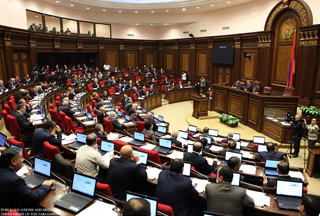Cooperation between government and opposition driven by Russia’s interests

The National Assembly of Armenia approved the gas agreement with Russia by 72 votes for, 0 votes against and 0 abstained.
This agreement envisages the handover of Armenia’s last share (20%) in ArmRusGazArd company to the Russian GazProm company. The three so-called parliamentary opposition powers – Heritage, ARF and ANC – did not vote against this bill, which they declared humiliating for Armenia. PA party, which claims to be an alternative political power, did not vote against the bill either. They all boycotted and left the session, leaving it for the ruling power to adopt the bill unanimously. Three days before the voting the Heritage, ANC and ARF parties announced that they would vote against the bill. Prosperous Armenia party was honest enough to openly say that they would boycott the session.
In order to enable the PA and other non-governmental parliamentary powers not to vote against the bill, parliamentarians staged a “performance” in the beginning of the session. ANC faction head Levon Zurabyan took a break for twenty minutes before the voting. During the break, Heritage faction chairperson Zarouhi Postanjyan took the voting cards of RPA governmental party members from their tables. When pro-government MPs returned from the break, they found out that their cards were missing. NA speaker Hovik Abrahamyan said that as it would not be possible to organize the voting electronically, they would do it by raising hands. Some MPs, who call themselves opposition, announced that RPA did not have quorum. For example, Nikol Pashinyan said that there were only 65 people sitting in the area for RPA and LS parties. When Hovik Abrahamyan announced the opening of the vote, the MPs of non-governmental factions left the hall. If the opposition powers were really convinced that the parliamentary majority would not be able to provide quorum, it would be better for them to stay in the room and observe the vote counting process instead of leaving it for the governmental power only to vote and count their own votes. The chairman of the Controller Commission, Sukias Avetisyan, counted raised hands and announced that 77 people had voted for the approval of the agreement (later NA speaker Hovik Abrahamyan announced that there had been confusion during the vote count, and the number of the votes for the bill was not 77 but 72).
After leaving the room the non-parliamentary powers disseminated an announcement saying that the bill was not approved. To support their assertion they referred to Article 24.5 of the parliamentary bylaws, according to which decisions of the Controlled Commission shall be adopted by the majority of votes. ARF faction member Artsvik Minasyan said that they were going to take an application form from the parliament for the purpose of applying to the Constitutional Court. However, the announcement did not say anything specific about applying to the Constitutional Court.
One week before the voting we wrote that in the framework of the NA bylaws the factions that claim themselves to be opposition could not be against the proposed agreement with Russia, and would not be able to prevent the Russian expansion in Armenia. They cannot act against it because they are not fighting for the purpose of protecting Armenia’s right of sovereignty but they are fighting for power. After the announcement of Armenia possible integration with the Customs Union it became clear that government in Armenia is fully under the control of Russia. This is the reason why these factions have to show that despite the ruling political power, which is trying to maneuver between the West and Russia, they are ready to surrender themselves to Russia without playing games with the West. Because in Armenia not only the government but also the opposition is appointed by Russia.
What would happen if the MPs that were acting against the bill would stay in the hall and vote against it? The parliamentary powers that are not pro-government have 53 seats. Independent MP Edmon Marukyan joined the boycott too. If they would jointly vote against the bill, it would return 54 votes against the bill. As a result, the bill would be adopted not with 72 votes for and 0 against, but 72 votes for and 54 ones against. Wouldn’t it show that the bill was passed in the government though a harsh resistance of the opposition?
The parliamentary powers that are not pro-government claim that by boycotting they made the result of the vote illegal. These claims are baseless because 72 MPs participated in the vote, and all of them raised their hands for the purpose of adopting the mentioned agreement. It is not very important if all members of the Controller Commission participated in the vote count or no. There is a video recording that shows 72 people raising their hands. This is fairly enough to consider the vote legitimate. If four factions collect signatures and file a claim to the Constitutional Court, the CC will legitimate the vote with another high instance decision.
The fact is that through an excellently staged performance in the parliament everyone solved his/her problem: the pro-government power – RPA and LS – passed the bill in the parliament through a unanimous vote, RPA, ARF, PA and Heritage saved their image as they staged a brave action to boycott the voting.
By Avetis Babajanyan

























